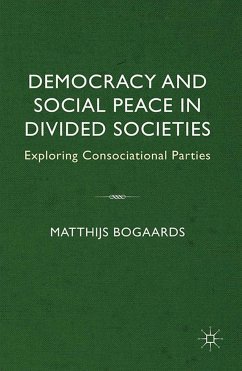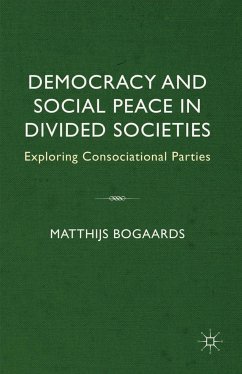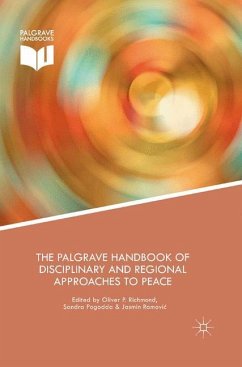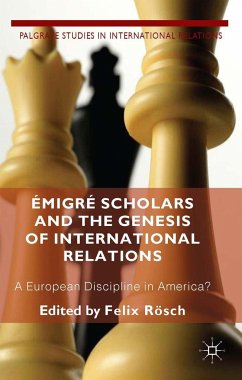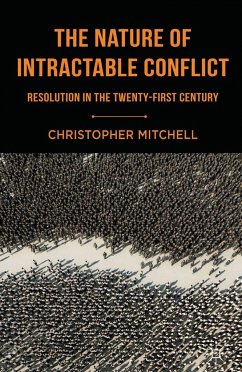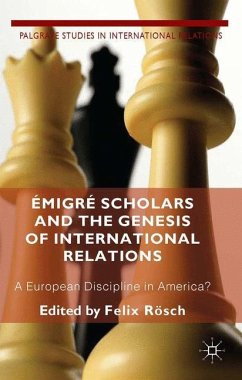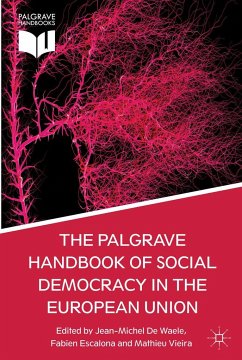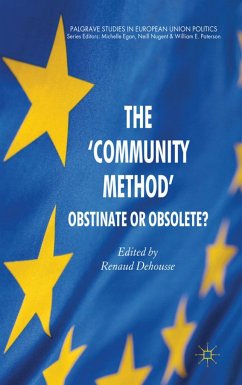
Broschiertes Buch
The Palgrave International Handbook of Peace Studies
A Cultural Perspective
Herausgegeben: Dietrich, Wolfgang; Alvarez, J. Echavarría; Esteva, G.; Ingruber, D.; Koppensteiner, N.; Loparo, Kenneth A.
Versandkostenfrei!
Versandfertig in 6-10 Tagen

PAYBACK Punkte
87 °P sammeln!





This handbook explores the etymological meaning and the religious, legal and political connotations of the concept of 'peace'. The wide range of international contributors provide evidence to show how adopting a multi-faceted approach to peace could ultimately lead to a more authentic understanding of peace across the world.
Thirty-four outstanding scholars write about the etymological meaning and the religious, legal and political connotations of the concept of 'peace'. They provide firm evidence to show how adopting a multi-faceted approach to 'peace' could ultimately contribute to the search for a more authentic understanding of 'peace' across the world stage.
ASTIER M. ALMEDOM is Director of the International Resilience Program at the Institute for Global Leadership, Tufts University, USA. IKURO ANZAI is honorary director of the Kyoto Museum for World Peace at Ritsumeikan University, Japan. ALEV ÇAKIR is interested in peace and conflict research, international development, migration and integration and Alevilik. JOSEFINA ECHAVARRÃ?A A. lectures at the UNESCO Chair and MA Program for Peace Studies at the University of Innsbruck, Austria, and at the MA in Latin American Studies, University of Vienna, Austria. MARC H. ELLIS is Professor of Jewish Studies and of History, and Director of the Center for Jewish Studies at Baylor University, USA. GUSTAVO ESTEVA is a grassroots activist, a public intellectual and an independent writer. MUNIR FASHEH established the Tamer Institute for Community Education in 1989 in Palestine, and established and directed the Arab Education Forum from 1997 until 2007 at the Centre for Middle Eastern Studies at Harvard University. VICTORIA FONTAN is Associate Professor and Head of the Department of Peace and Conflict Studies at the University for Peace, Costa Rica. JOHAN GALTUNG is Director of Transcend, founder of the Peace Research Institute, Oslo (PRIO), Norway, and Professor at the University of Hawaii. ARUN GANDHI is founder and President of the Gandhi Worldwide Education Institute, USA. BELACHEW GEBREWOLD is Lecturer of International Relations at Helmut-Schmidt University, University of theFederal Armed Forces in Hamburg, Germany, and teaches at the UNESCO Chair for Peace Studies, Innsbruck, Austria. ARTURO GUERRERO is Professor of Communication and Pedagogy, and works with young Mazatecs and Mixtecs. AURANGZEB HANEEF studied at Harvard Divinity School, USA. PETER HORSLEY works with indigenous communities on sustainability projects in New Zealand and the South Pacific. DANIELA INGRUBER is staff-member of the UNESCO Chair for Peace Studies and Lecturer at the University of Innsbruck, Austria. ELIDA KRISTINE UNDRUM JACOBSEN is a researcher at the International Peace Research Institute, Oslo (PRIO), Norway. HANNES KALISCH is a member of the Enlhet Community of the Chaco in Paraguay. MARTINA KALLER-DIETRICH is Associate Professor of Global History at the University of Vienna, Austria. KAM-POR YU is a moral philosopher and Senior Lecturer in the Faculty of Humanities of the Hong Kong Polytechnic University. KARLHEINZ KOPPE is former Chair of the German Society for Peace Studies, former Secretary of the European Peace Research Association, former Secretary General of the International Peace Research Association and visiting professor at the University of Mÿnster, Germany. NORBERT KOPPENSTEINER is Program Coordinator of the MA in Peace, Development, Security and International Conflict Transformation, and Research and Publications Coordinator of the UNESCO Chair for Peace Studies at the University of Innsbruck, Austria. SAMRAT SCHMIEM KUMAR is Lecturerof Peace and Conflict Studies, Oslo University College, Pondicherry, India. PAT LAUDERDALE is Professor in the School of Justice and Social Inquiry at Arizona State University, USA. SYED SIKANDER MEHDI is Convenor of the Peace and Cultural Studies Project, in Karachi and former chair of the Department of International Relations and former registrar of Karachi University, Pakistan. BEATRIZ MOLINA is Professor at the Department of Semitic Studies and director of the Institute of Peace and Conflicts at the University of Granada, Spain. FRANCISCO A. MUÃ'OZ is Professor of History at the Institute of Peace and Conflicts at the University of Granada, Spain. KOFI ASARE OPOKU is Visiting Professor of Religion and Co-Chair of Africana Studies, Yale University, USA. UZMA REHMAN has a Ph.D. from the Department of Cross-Cultural and Regional Studies at the University of Copenhagen, Denmark. GRIMALDO RENGIFO V. founded the PRATEC (Proyecto Andino de TecnologÃas Campesinas / Andean Project of Peasant Technologies). AMADOU LAMINE SARR is Associate Professor of History at the University of Vienna, Austria. SWAMI VEDA BHARATI is a travelling lecturer and Spiritual Guide since 1947. He holds the title of High Monk in the Swami Order of Monks and has worked as international Meditation Guide with 50 meditation groups around the world. KARMA LEKSHE TSOMO is Associate Professor of Theology and Religious Studies at the University of San Diego, USA. ROBERT VACHON is co-founderand lifetime Director of the Journal InterCulture at the Intercultural Institute of Montreal (IIM), Canada. NIGEL YOUNG is Professor Emeritus in the Sociology Department and former director of the Peace Studies Program at Colgate University, USA.
Produktdetails
- Verlag: Palgrave Macmillan / Palgrave Macmillan UK / Springer Palgrave Macmillan
- Artikelnr. des Verlages: 978-1-137-45323-5
- 2011 edition
- Seitenzahl: 625
- Erscheinungstermin: 11. Januar 2011
- Englisch
- Abmessung: 233mm x 154mm x 40mm
- Gewicht: 980g
- ISBN-13: 9781137453235
- ISBN-10: 1137453230
- Artikelnr.: 41084236
Herstellerkennzeichnung
Libri GmbH
Europaallee 1
36244 Bad Hersfeld
gpsr@libri.de
"No other book of peace studies provides such a rich, in depth, and wonderfully interactive conversation about our many understandings and lived cultural etymologies around a single word [ ] An extraordinary balance and contribution to a field overly dominated by narrow academic definitions, a must for our classes and bookshelves." - John Paul Lederach, Kroc Institute University of Notre Dame, USA
"A festival of epistemologies, ideas, and philosophies, one will find much to stimulate their thinking in this book, not only about the diverse and multitude philosophies of peace but also about cultural diversity and interculturalism. It is an invaluable and indispensable contribution to peace studies and social sciences and philosophy
"A festival of epistemologies, ideas, and philosophies, one will find much to stimulate their thinking in this book, not only about the diverse and multitude philosophies of peace but also about cultural diversity and interculturalism. It is an invaluable and indispensable contribution to peace studies and social sciences and philosophy
Mehr anzeigen
in general." - Alberto G. Gomes, La Trobe University, Australia
"While firmly rooted in the scholarly field of peace and conflict research, this book takes our understanding of peace as a value, as a state of mind and as a process to another level [ ] The Handbook is refreshingly readable and will intellectually and emotionally re-energise and inspire all who read it. An outstanding achievement." - Tom Woodhouse, University of Bradford, UK
"Dietrich and his team succeed in allowing readers, who compare diverse ways of making peaces, to elaborate their own reflections attentive to a reciprocal interpellation between different wisdoms, cultures and beliefs [ ] The book does not 'prescribe' to readers how they should think about peace, but opens the possibility to elaborate in an elicitive manner, from the background of their own 'bank of social knowledge' the diverse ways to transform conflicts through peaceful means." - Vicent Martínez Guzmán, Universitat Jaume I, Castelló, Spain
"While firmly rooted in the scholarly field of peace and conflict research, this book takes our understanding of peace as a value, as a state of mind and as a process to another level [ ] The Handbook is refreshingly readable and will intellectually and emotionally re-energise and inspire all who read it. An outstanding achievement." - Tom Woodhouse, University of Bradford, UK
"Dietrich and his team succeed in allowing readers, who compare diverse ways of making peaces, to elaborate their own reflections attentive to a reciprocal interpellation between different wisdoms, cultures and beliefs [ ] The book does not 'prescribe' to readers how they should think about peace, but opens the possibility to elaborate in an elicitive manner, from the background of their own 'bank of social knowledge' the diverse ways to transform conflicts through peaceful means." - Vicent Martínez Guzmán, Universitat Jaume I, Castelló, Spain
Schließen
Für dieses Produkt wurde noch keine Bewertung abgegeben. Wir würden uns sehr freuen, wenn du die erste Bewertung schreibst!
Eine Bewertung schreiben
Eine Bewertung schreiben
Andere Kunden interessierten sich für


